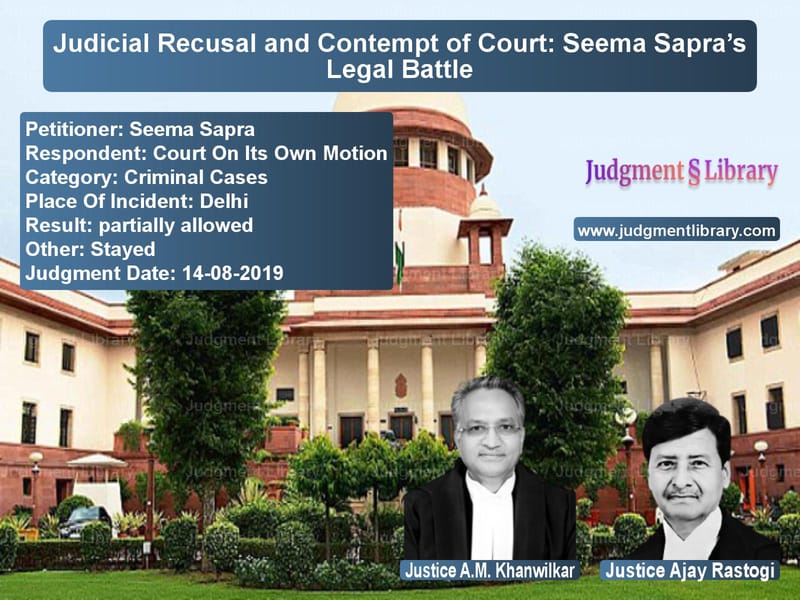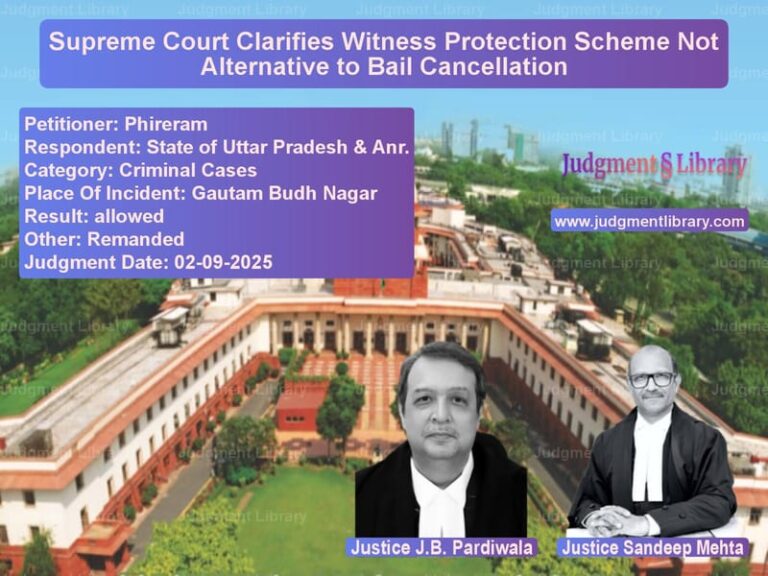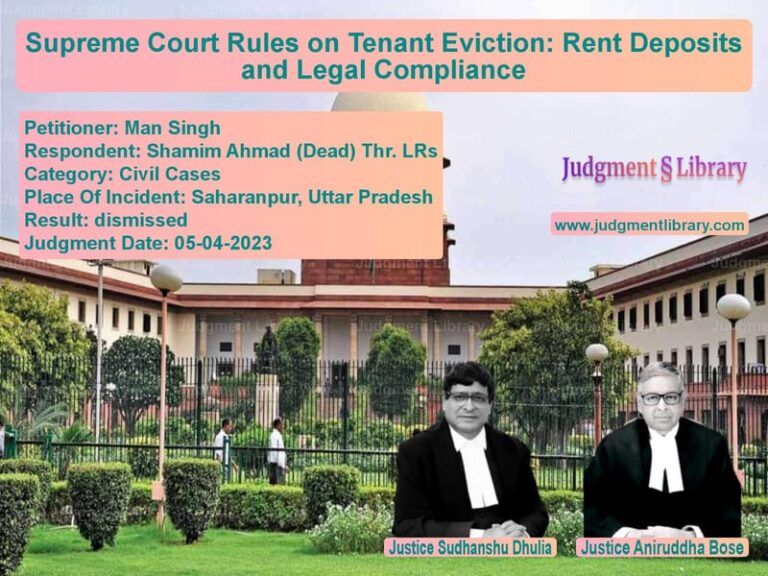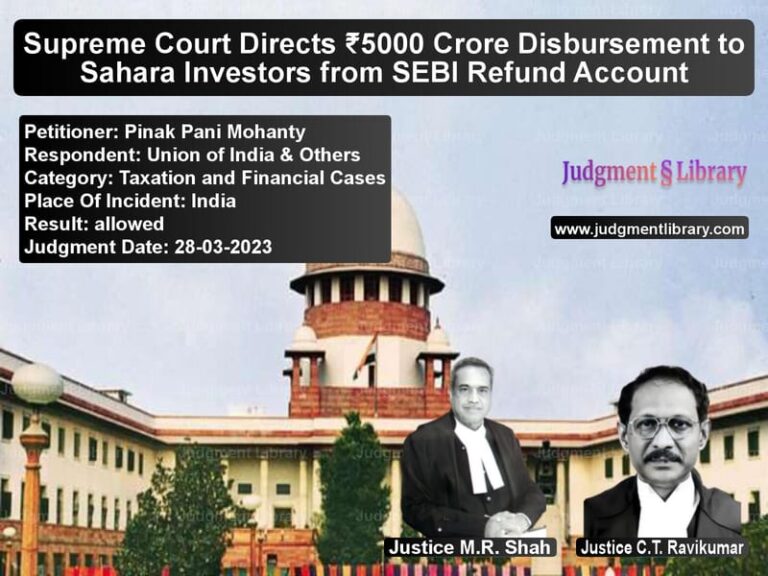Judicial Recusal and Contempt of Court: Seema Sapra’s Legal Battle
The case of Seema Sapra vs. Court on Its Own Motion is a significant legal battle concerning contempt of court, judicial recusal, and the rights of advocates. This case emerged from a contempt of court ruling by the Delhi High Court, which found Seema Sapra guilty and imposed a sentence of one month of imprisonment along with a fine of Rs. 2,000. Additionally, she was barred from appearing before the High Court of Delhi and its subordinate courts for a period of two years.
The appellant, Seema Sapra, challenged this ruling through a criminal appeal under Section 19(1) of the Contempt of Courts Act, 1971. She also filed multiple interlocutory applications seeking various reliefs, including judicial recusal and personal security. The case raised critical questions about the principle of judicial recusal, the limits of contempt jurisdiction, and the rights of whistleblowers and advocates.
Background of the Case
The case originated when Seema Sapra, an advocate, was held guilty of contempt of court for certain utterances she made before the High Court of Delhi on 6th May 2014. The High Court ruled that her statements constituted criminal contempt in the face of the court. As a result, she was sentenced to imprisonment and barred from arguing cases, either as an advocate or in-person, before the High Court of Delhi for two years.
The appellant claimed that her actions were justified and that she was being unfairly targeted for raising complaints about corruption and misconduct by members of the Supreme Court Bar Association. She further alleged that she was being poisoned and harassed due to her whistleblowing activities. In her appeal, she sought to overturn the contempt ruling, arguing that the punishment was excessive and that the judgment was biased.
Petitioner’s Arguments
Seema Sapra, appearing in-person, presented a series of arguments challenging the High Court’s ruling:
- She contended that the contempt proceedings against her were unfair and politically motivated.
- She argued that her utterances did not amount to criminal contempt as they were made in the course of defending her rights as an advocate.
- She alleged that multiple judges of the Delhi High Court had recused themselves from hearing her case, which indicated an unfair bias against her.
- She demanded the recusal of Justice A.M. Khanwilkar, citing his alleged proximity to certain advocates against whom she had made corruption allegations.
- She sought protection from the government, claiming that she was being poisoned and harassed due to her whistleblowing activities.
Respondent’s Arguments
The Court, acting as the respondent, took a firm stance against the petitioner’s claims:
- The Court emphasized that judicial recusal should not be at the mere asking of a litigant unless there were justifiable reasons.
- It observed that 28 judges of the Delhi High Court had recused themselves from her case, which had caused undue delay in the proceedings.
- The Court noted that allegations of bias should be substantiated with clear evidence and not used as a tool for forum shopping.
- It ruled that the petitioner’s demand for recusal was based on unfounded fears and personal grievances rather than valid legal grounds.
Judicial Observations
In dismissing the petitioner’s demand for recusal, the Court made the following observations:
“The path of recusal is often a convenient and soft option. However, the oath of office taken under Article 219 of the Constitution enjoins the Judge to perform the duties of office without fear or favor, affection or ill will.”
It further cited Lord Denning’s statement:
“We must rely on our conduct itself to be its own vindication. Exposed as we are to the winds of criticism, nothing will deter us from doing what we believe is right.”
Outcome of the Appeal
The Supreme Court admitted the appeal despite a 32-day delay in filing. While the two-year restriction on her legal practice had already expired, the Court stayed the effect of the impugned judgment until the final disposal of the appeal. It also disposed of multiple interlocutory applications, allowing Sapra to pursue her legal remedies through appropriate channels.
Other Applications Filed by the Petitioner
The petitioner filed several applications along with her appeal, seeking various forms of relief. Some of the notable applications included:
- I.A. No. 62789 of 2019: Sought the recusal of Justice A.M. Khanwilkar and a direction for the cases to be listed before another bench.
- I.A. No. 99303 of 2019: Requested police protection and secure housing for the petitioner, claiming threats to her life.
- I.A. No. 112422 of 2018: Sought permission to place additional documents on record to support her corruption allegations.
- I.A. No. 30030 of 2018: Challenged the appointment of Senior Advocate Vikas Singh as Amicus Curiae.
The Court dismissed these applications, ruling that they were either premature or beyond the scope of the present proceedings. However, it allowed the petitioner to pursue her grievances through appropriate legal forums.
Conclusion
The case of Seema Sapra highlights the complexities of contempt proceedings and judicial recusal. While the petitioner raised concerns over bias and fair trial rights, the Court maintained that recusal should not be sought on mere allegations. The ruling reaffirmed the importance of judicial integrity and the need to prevent forum shopping in legal proceedings.
Petitioner Name: Seema Sapra.Respondent Name: Court On Its Own Motion.Judgment By: Justice A.M. Khanwilkar, Justice Ajay Rastogi.Place Of Incident: Delhi.Judgment Date: 14-08-2019.
Don’t miss out on the full details! Download the complete judgment in PDF format below and gain valuable insights instantly!
Download Judgment: Seema Sapra vs Court On Its Own Mot Supreme Court of India Judgment Dated 14-08-2019.pdf
Direct Downlaod Judgment: Direct downlaod this Judgment
See all petitions in Contempt Of Court cases
See all petitions in Judgment by A M Khanwilkar
See all petitions in Judgment by Ajay Rastogi
See all petitions in partially allowed
See all petitions in Stayed
See all petitions in supreme court of India judgments August 2019
See all petitions in 2019 judgments
See all posts in Criminal Cases Category
See all allowed petitions in Criminal Cases Category
See all Dismissed petitions in Criminal Cases Category
See all partially allowed petitions in Criminal Cases Category







